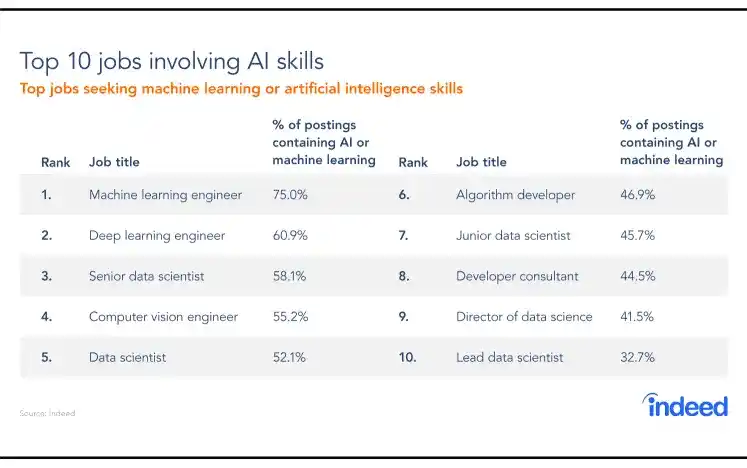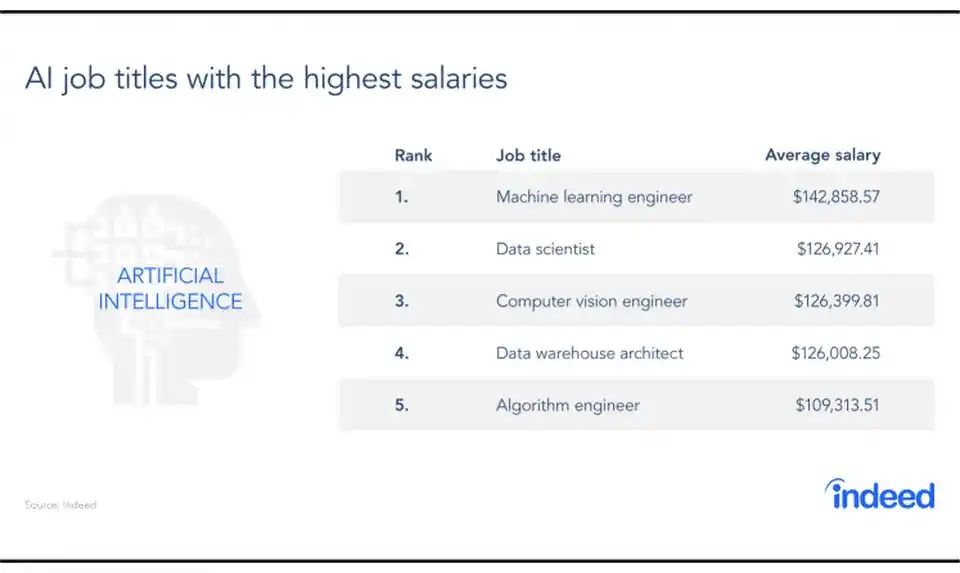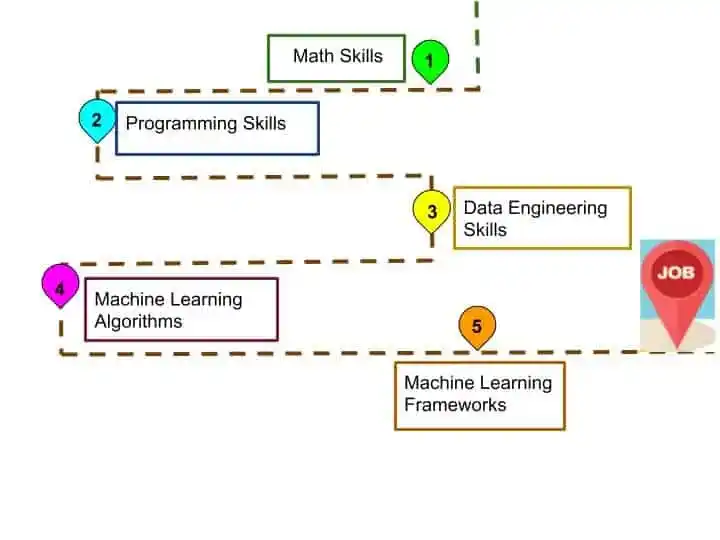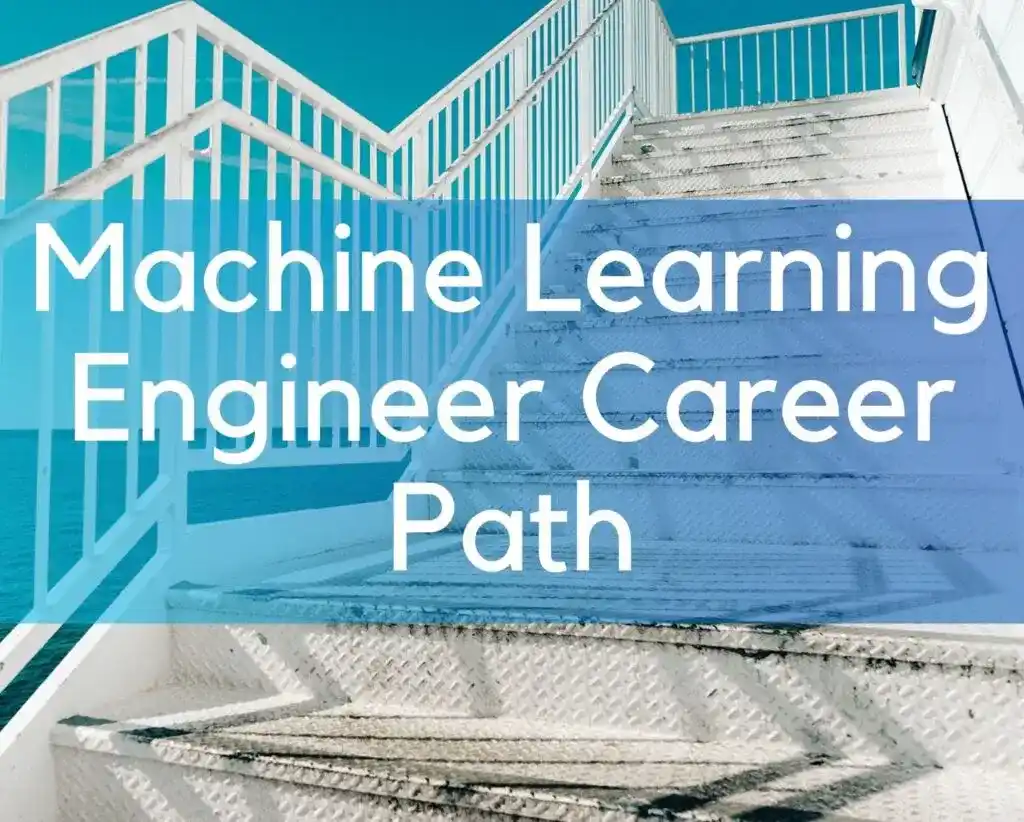So, You are Planning to become a Machine Learning Engineer?. First of all, Congratulations!. You have chosen a profitable, secure, and most demanding career. But if you are stuck with lots of questions like, “What is Machine Learning?”, “What does Machine Learning Engineer do?”, “What skills are required for Machine Learning?”, and much more. Then read this full article. In this article, I will discuss all details related to Machine Learning Engineer Career Path.
In a Hurry?… Jump directly to the “Career Path“.
- What is Machine Learning?
- Who is Machine Learning Engineer?
- What does Machine Learning Engineer do?
- Roles and Responsibilities of Machine Learning Engineer
- Machine Learning Engineer Job Trends
- What is the Salary of Machine Learning Engineers?
- What Qualification is Required for ML Engineers?
- Skills Required for Machine Learning Engineer
- Career Path
- Step 1- Improve your Math Skills
- Step 2- Learn Programming Languages
- Step 3- Learn Database Concepts
- Step 4- Learn Machine Learning Algorithms
- Step 5- Gain Knowledge about Machine Learning Frameworks
- Step 6- Start Practicing with Real- World Projects
- Step 7- Learn Deep Learning Concepts
- Step 8- Learn BigData Visualization Tools
- Step 9- Make a Strong Resume
- Conclusion
Let’s get Started-
Machine Learning Engineer Career Path
Before moving to Machine Learning Engineer Career Path, I would like to discuss What is Machine Learning?, and Who is Machine Learning Engineer?
What is Machine Learning?

As the name suggests ” Machine Learning“. That means Machines are Learning something.
Right?.
Machine Learning (ML) allows machines to learn in the same way as a human learns.
ML is the subpart of Artificial Intelligence. Machine Learning learns from the training data or self-experiences.
ML is the same as a Newborn child. The newborn child learns from the instructions given by his parent and by his self-experience. He tries to walk but he falls. And then again tries to walk. Similarly Machine Learning Works.
ML learns from training data, predicts the output. Based on the predicted output, it improves accuracy by predicting again.
I hope now you Understood What is Machine Learning. Now let’s see Who is Machine Learning Engineer?
Who is Machine Learning Engineer?
A Machine Learning Engineer is a programmer who builds machines and systems that can learn and react similarly to human beings. The goal of a Machine Learning Engineer is to achieve Artificial Intelligence.
You will understand more about Machine Learning Engineer in the next section, “What does Machine Learning Engineer do?
What does Machine Learning Engineer do?
Machine Learning work with the following steps-
- Data Collection.
- Data Preprocessing.
- Choose a Machine Learning Algorithm.
- Training the Model.
- Testing the Model.
- Tuning the Model.
So, as a machine learning engineer, you have to perform all these steps.
Machine Learning Engineers create a Machine Learning model that can work properly with the best performance. Machine Learning Engineers have to choose the right algorithms as per model compatibility and requirement.
They have to extract ideas from the data science team, choose appropriate tools and ecosystems, Use machine Learning frameworks, and stay up to date with the latest development.
Now, let’s see the Roles and Responsibilities of Machine Learning Engineers-
Roles and Responsibilities of Machine Learning Engineer
- Study and convert Data Science Prototypes.
- Build Machine Learning models.
- Research and apply appropriate Machine Learning tools and algorithms.
- Build a Machine Learning application based on industry requirements.
- Choose correct datasets and data visualization methods.
- Conduct Machine Learning tests and experiments.
- Execute Statistical Analysis and fine-tuning with the help of test results. (Statistical Analysis is a small part of ML Engineers whereas it’s a major job part of Data Analyst).
- Train and Retrain the model based on model accuracy.
- Stay updated with the latest development in the field.
So, these are the Roles and responsibilities of the Machine Learning Engineer. As you are planning to enter into the Machine Learning field, you might have a question in your mind, ” What are the Machine Learning Engineer Job Trends?”. So, let’s see what are the Job Trends
Machine Learning Engineer Job Trends
According to the Forbes Article–
- AI and Machine Learning job postings on Indeed rose 29.10% over the last year between May 2018 and May 2019.
- The Indeed analytics team found that the average annual salary for Machine Learning Engineers has grown by $8,409 in just a year, increasing 5.8%. Algorithm engineer’s average annual salary rose to $109,313 this year, an increase of $5,201, or 5%.

So, according to this data, Machine Learning Engineer is definitely a profitable, secure, and most demanding career. Now, let’s see What is the average salary of a Machine Learning Engineer?
What is the Salary of Machine Learning Engineers?
According to Indeed, the average salary of a Machine Learning Engineer is- $ 142,858.67

But, this is not the salary of Entry-Level or Mid-level ML Engineers. So, let’s see How much Entry-level and Mid-Level ML Engineers earn?
Entry-Level Machine Learning Engineers salary
Entry-level ML Engineers means someone with 0-4 years of experience, and who is a college pass-out or someone who switch their job and landed in Machine Learning Field.

So, the average pay of an Entry-Level ML Engineer is $97,090 but after adding bonus and profit-sharing, the pay can become $130,000 or more.

Now, let’s see the average salary of a Mid-level ML Engineer-
Mid-Level Machine Learning Engineers salary
A mid-level Machine Learning Engineer means someone with 5-9 years of experience. So, according to PayScale, the average salary of a mid-level machine learning engineer is $112,095.

I hope, now you have a clear idea about Machine Learning Engineer salaries. Now, let’s move to the most important topic, “Qualification for Machine Learning Engineers“.
What Qualification is Required for ML Engineers?
Most Machine Learning Engineer jobs require a Master’s or Ph.D. in Computer Science, software engineering, and other related fields. Machine Learning Engineer is not a Graduate level job.
It requires years of experience in data science and software engineering, as well as an advanced college degree.
Becoming a Machine Learning Engineer is easy If you are a Software Engineer and want to switch your job or you have completed your Master’s or Ph.D. in a related field.
So, this is the required qualification for ML Engineers, but only having a degree is not enough. You should have some required skills to become a Machine Learning Engineer.
Now, let’s see What skills are required-
Skills Required for Machine Learning Engineer
These are some must-have skills for machine learning engineers-
1. Programming Language
Knowledge of Programming language is compulsory for machine learning. For Machine Learning, the most popular programming languages are Python, R, Java, and C++. As a beginner, you can start with Python, but sometimes Python is not enough for machine learning tasks. That’s why you should know all these programming languages.
But Python and R are the most wanted languages for machine learning engineers.
R Programming language is good for statistical operations whereas to implement mappers and reducers in Hadoop, you should be familiar with Java.
Along with that, You should have a good understanding of Classes, Data Structure, algorithms, and memory management.
2. Mathematics Skill
Knowledge of Mathematics is very important to understand how machine learning and its algorithms work. In math, the most important topics are-
- Probability and Statistics
- Linear Algebra
- Calculus
Now, let’s have a detailed look at all of them-
a). Probability and Statistics
Probability and statistics are used in Bayes’ Theorem, Probability Distribution, Sampling, and Hypothesis Testing.
b). Linear Algebra
Linear Algebra has two important terms- Matrices and Vectors. They are both used widely in Machine Learning. Matrices are used in Image Recognition.
c). Calculus
In Calculus, you have Differential Calculus and Integral Calculus. These terms help you to determine the probability of events. For example, finding the posterior probability in the Naive Bayes model.
3. Data Engineering Skills
For building a machine learning model, you need data for training and testing. That’s why knowledge of data engineering is important. Data Engineering contains 3 basic steps-
- Data pre-processing- Data pre-processing step is performed before you process the data. Data pre-processing steps are cleaning, parsing, correcting, and consolidating the data.
- ETL (Extract, Transform, and Load)- In this step, you need to perform extraction of data from the internet or local server, then transform the data into a suitable format and after that load the data into your program. That’s why you should have knowledge of ETL so that you can perform these steps easily.
- Knowledge of Database- You should be familiar with DBMS like SQL, Oracle Database, and No SQL.
4. Machine Learning Algorithms
You should know Machine Learning Algorithms like-
- Supervised Learning Algorithms
- Logistic Regression.
- K-Nearest Neighbors(K-NN)
- Support Vector Machine(SVM)
- Kernel SVM.
- Naive Bayes
- Decision Tree Classification.
- Random Forest Classification
- Unsupervised Learning Algorithms
- K-Means Clustering
- Hierarchical Clustering.
- Probabilistic Clustering
- Reinforcement Learning Algorithms
- Policy Optimization.
- Q-Learning
- Learn the Model
- Given the Model.
5. Machine Learning Frameworks
Machine Learning Frameworks make the life of developers and machine learning engineers a whole lot easier. ML Frameworks remove the complex part of machine learning and make it available for everyone who wants to use it.
These are some widely used Machine Learning Frameworks-
- TensorFlow.
- Theano.
- scikit learn.
- PyTorch.
- Keras.
- DL4J.
- Caffe.
- Microsoft Cognitive Toolkit.
Now, let’s discuss some framework in detail-
a) Tensorflow-
Tensorflow is the most widely used framework in Machine Learning and Deep Learning. It is an open-source software library. It is used for numerical computation using the data flow graph.
b) Theano-
Theano helps you define, optimize, and evaluate mathematical operations. LASAGNE, BLOCKS, and KERAS are its most popular libraries.
c) scikit learn-
It is built on top of existing libraries like NUMPY, SCIPY, and MATPLOTLIB. It has started as a GOOGLE SUMMER OF CODE and now has 23,000 Github commits.
6. Deep Learning Algorithms
Deep learning is the subpart of machine learning. And it is much more powerful than machine learning. Deep learning is getting more interest nowadays. That’s why you should be familiar with Deep Learning Algorithms.
The most used Deep Learning Algorithms are-
- Feedforward Neural Network.
- Backpropagation.
- Convolutional Neural Network.
- Recurrent Neural Network.
- Generative Adversarial Networks (GAN).
But you may be thinking What’s the difference between Deep Learning and Machine Learning?.
So, this is the main difference between Machine Learning and Deep Learning-
Deep Learning gives excellent results on large datasets. But Machine Learning algorithms fail to process huge datasets. Machine Learning can work only on small datasets. This is the limitation of Machine Learning. But Deep Learning can easily perform operations on large datasets.
So, these are some Must have skills for Machine Learning Engineer Job. Now, let’s see the Machine Learning Engineer Career Path-
Career Path

The Machine Learning Engineer Career Path is not much different than the skills that I discussed in the previous section. But let’s see in what order you should learn these skills and what other things you should do.
Step 1- Improve your Math Skills
You should start by learning Math first. Because without knowledge of maths and statistics it’s difficult to understand the concepts of machine learning. Now, you may be thinking, from where did I learn Math for Machine Learning?
If you are thinking the same, then don’t worry I have chosen some best resources for learning Math.
Resources for Learning Math-
- Mathematics for Machine Learning Specialization (Coursera)– This Specialization program will help you to understand the concepts of Mathematics required in Machine Learning.
- Statistics with R Specialization– This specialization program will give you more in-depth on Statistics with the help of R.
For more details on Math Courses for Machine Learning, read this article- Best Math Courses for Machine Learning- Find the Best One!
Step 2- Learn Programming Languages
After having a good understanding of Mathematics, learn Programming Languages. To build a machine learning model, you should be familiar with programming languages. If you are a complete beginner in programming, then start with Python. Python is easy to understand language.
But if you already know Python, then learn R and SQL. Python, R, and SQL are enough to perform most of the operations. But it’s good to know Java and C.
There are various resources are available for learning Programming. I have chosen some of the best online courses for programming languages.
Resources for learning Programming-
- Python for Everybody – This is one of the most popular and highly enrolled Specialization Program. 1.7 M students have enrolled in this specialization program. This specialization program will teach you fundamental programming concepts including data structures, networked application program interfaces, and databases, using the Python programming language.
- R Programming – This course will cover all the basics of R Programming. If you want to learn R from scratch, then this course is for you. In this course, you will learn how to program in R and how to use R for effective data analysis.
- Excel to MySQL– This Specialization program is offered by Duke University. This is one of the best SQL online course certificate program. You will work with tools like Excel, Tableau, and MySQL to analyze data, create forecasts and models, design visualizations, and communicate your insights.
Step 3- Learn Database Concepts
Gain some knowledge of DBMS. Knowledge of Database Management systems is required for Machine Learning Engineers like MySQL, MongoDB, and NoSQL.
Resources for Learning DBMS-
- W3Schools– You can learn DBMS and its concepts from the Free Tutorial of W3Schools.
- Learn SQL Basics for Data Science Specialization– Coursera– This specialization program is dedicated to those who have no previous coding experience and want to develop SQL query fluency. In this program, you will learn SQL basics, data wrangling, SQL analysis, AB testing, distributed computing using Apache Spark, and more.
Step 4- Learn Machine Learning Algorithms
To build a machine learning model, you should have a strong understanding of Machine learning algorithms. Then only you can build your ML models. Once you have learned math, programming, and DBMS it’s easy to understand the Machine Learning algorithms concepts.
To learn Machine Learning algorithms, you can refer to books, YouTube Tutorials, and Online Courses. I have chosen some of the resources for you-
Resources for learning ML Algorithms-
- Machine Learning (Coursera) by Andrew Ng– This is no doubt one of the Best Online Course for Machine Learning. This Course provides you a broad introduction to machine learning, data-mining, and statistical pattern recognition. All the math is required for Machine Learning is well discusses in this course.
- Machine Learning with Python (Coursera) by IBM- This is another Machine Learning course for Beginners. This course starts with the basics of Machine Learning. Python is used in this course to implement Machine Learning algorithms.
- Hands-On Machine Learning with Scikit-Learn, Keras, and TensorFlow (BOOK)– This book will teach you how you can implement Machine Learning algorithms in Python.
I have listed my favorites Machine Learning Courses in this article- Best Online Courses On Machine Learning You Must Know
Step 5- Gain Knowledge about Machine Learning Frameworks
Machine Learning Frameworks are an interface, library, or tool which allows developers to build machine learning models easily, without getting into the depth of the underlying algorithms. That’s why you should know these Frameworks.
At least, in the beginning, you should know TensorFlow, Scikit-learn, Theano, and PyTorch.
You can learn these frameworks from their official websites or online courses. I have listed some of the resources for learning these frameworks-
- TensorFlow– This is the official website of TensorFlow. From here, you can learn everything related to this Framework.
- TensorFlow in Practice Specialization (Coursera)– This Specialization program is offered by deeplearning.ai. This program will teach you Best practices for TensorFlow, Build natural language processing systems using TensorFlow, Handle real-world image data and explore strategies, etc.
Step 6- Start Practicing with Real- World Projects
Now, you have enough skills to build your first Machine Learning Model. It’s time to build some machine learning projects. Projects are most important to get a job as a Machine Learning Engineer.
The more projects you will do, the more in-depth your understanding of ML you will grasp. Projects will also provide more privilege to your Resume.
If you are not clear on where to start with Machine Learning Projects, you can go to Kaggle and choose any dataset. Once you have a dataset, you will get an idea of what you can do with it. You can choose projects in DataCamp.
Do this for a couple of projects, and then look up common problems on the internet and try to solve them by acquiring relevant datasets.
Step 7- Learn Deep Learning Concepts
As a Machine Learning Engineer, knowledge of Deep Learning is also important. Why? Because most of the time you have to deal with large datasets, and for that, you need to apply deep learning algorithms. You should be familiar with some most popular deep learning algorithms-
- Feedforward Neural Network.
- Backpropagation.
- Convolutional Neural Network.
- Recurrent Neural Network.
- Generative Adversarial Networks (GAN).
You can learn Deep Learning concepts from Books, Online Courses, and Tutorials. I have chosen some best learning resources for deep learning.
Learning Resources for Deep Learning-
- Deep Learning Specialization (deeplearning.ai) by Andrew Ng– This Deep Learning Specialization is an advanced course series for those who want to learn Deep Learning and Neural Network. Python and TensorFlow are used in this specialization program for Neural Network. This is the best follow up to Andrew Ng’s Machine Learning Course.
- Deep Learning (Adaptive Computation and Machine Learning series) (BOOK)- This book is known as the “Bible” of Deep Learning. The author Ian Goodfellow is the godfather of Deep Learning. That’s why this book is special for everyone who wants to learn the basics of Deep Learning. This book is a theoretical book. This Deep Learning book is especially for those who want to learn the basics and theory part of Deep Learning.
Step 8- Learn BigData Visualization Tools
You should have some basic knowledge of Big Data Visualization Tools. Why?. Because once you build your machine learning model, you need to showcase your model’s findings, patterns, and predictions.
So, to showcase your findings, you should be familiar with BigData Visualization Tools. Some most popular visualization tools are Tableau and PowerBI. These tools have in-built visualization reporting tools. By drag and drop, you can create a wonderful presentation report.
You can learn Data Visualization from these courses-
- Data Visualization with Tableau Specialization– This specialization program is intended for newcomers to data visualization with no prior experience using Tableau. At the end of this program, you will be able to generate powerful reports and dashboards that will help people make decisions and take action based on their business data.
- Data Visualization with Python– This course will teach you how to take data that at first glance has little meaning and present that data in a form that makes sense to people. This course will use several data visualization libraries in Python, namely Matplotlib, Seaborn, and Folium.
Step 9- Make a Strong Resume
Finally, you are ready to apply for a Machine Learning Engineer Job. Now, it’s time to make a strong Resume. Your Resume is the first impression for any recruiters. No matter how skilled you are, but if your resume is not attractive, sorry you will not get an interview call. That’s why you shouldn’t ignore your Resume.
If you want that your resume will get more privilege than others, then you should keep these things in mind-
- Read the job profile and check what skills they require, then see how many skills you have. Suppose in the job description they mentioned Good Mathematics Skills, and you have Good Mathematics Skills, then definitely write “Good Mathematics Skills” as the first skill. You can repeat the same for other skills too, just compare your skills and the skills written in Job Description. This tip will definitely help you.
- The template of your resume should be classic.
- Avoid templates with so many graphics. It gives a bad impression to the recruiter.
- Don’t hesitate about white spaces. That means don’t try to fill the full page with text. Leave some white space that looks clean.
- Don’t write a long text like a story. It should be precise and simple.
- Mention only the most important Machine Learning Projects. Don’t mention very basic projects.
- After finalizing your resume, you need to check for grammar and spelling mistakes. Because of any grammar or spelling mistakes, your full work will be wasted. So thoroughly check for grammar and spelling before sending it to the company. You can check it on Grammarly.
That’s all!. If you follow these steps and gain these required skills, then no one can stop you to land in Machine Learning Field.
Now it’s time to wrap up!
Conclusion
In this article “Machine Learning Engineer Career Path”, I tried to give you a complete road map for Machine Learning Engineer Job. In this article, you have learned the following-
- What is Machine Learning?, Who is Machine Learning Engineer?, Roles and Responsibilities of Machine Learning Engineer, and Machine Learning Engineer Job Trends.
- What is the Salary of Machine Learning Engineers?, What Qualification is Required for ML Engineers?, and Skills Required for Machine Learning Engineer.
- Machine Learning Engineer Career Path
I hope I tried to give you a complete Machine Learning Engineer Career Path. If you have any doubts or queries feel free to ask me in the comment section. I am here to help you.
All the Best for your Career!
Happy Learning!
Learn the Basics of Machine Learning Here
Looking for the best Machine Learning Courses? Read this article- Best Online Courses On Machine Learning You Must Know in 2026
Looking for Best Books on Neural Networks and Deep Learning? Read this article-10 Best Books on Neural Networks and Deep Learning, You Should Read
Read K-Means Clustering here-K Means Clustering Algorithm: Complete Guide in Simple Words
Are you ML Beginner and confused, from where to start ML, then read my BLOG – How do I learn Machine Learning?
If you are looking for Machine Learning Algorithms, then read my Blog – Top 5 Machine Learning Algorithms.
If you are wondering about Machine Learning, read this Blog- What is Machine Learning?
Thank YOU!
Though of the Day…
‘ Anyone who stops learning is old, whether at twenty or eighty. Anyone who keeps learning stays young.
– Henry Ford
Written By Aqsa Zafar
Aqsa Zafar is a Ph.D. scholar in Machine Learning at Dayananda Sagar University, specializing in Natural Language Processing and Deep Learning. She has published research in AI applications for mental health and actively shares insights on data science, machine learning, and generative AI through MLTUT. With a strong background in computer science (B.Tech and M.Tech), Aqsa combines academic expertise with practical experience to help learners and professionals understand and apply AI in real-world scenarios.


Very Nice article. Thank you for the guidance.
Glad that you liked my article.
Can we learn all this which you have instructed just having a b.e degree?
Yes, you can but you need to put extra efforts into machine learning projects. As an undergraduate, you need to showcase your practical knowledge as well as in-depth theoretical understanding.